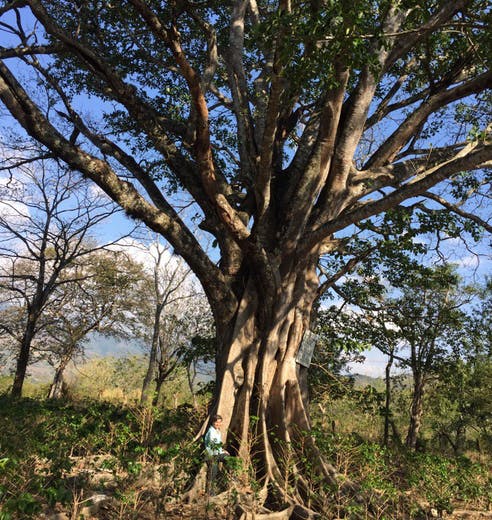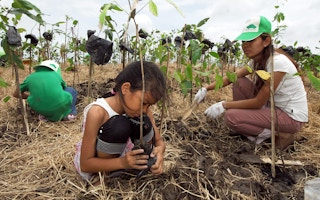All eyes are on New York City as almost 170 countries including Singapore, Australia, China, and the United States are expected to attend the United Nations Paris Climate Agreement signing ceremony on Friday - which also marks Earth Day - at the UN headquarters.
Celebrated every April 22, Earth Day is a global environmental movement initiated by the United States-based Earth Day Network which encourages communities and organisations to take actions such as planting trees, participating in environmental marches, and cleaning up their local communities.
The Paris climate deal, signed by 195 nations last December, aims to cap global temperature rise at well below 2 degrees Celsius above pre-industrial levels by the end of the century, and achieve zero net emissions by mid-century. Its signatories will have to make significant cuts to carbon emissions to fulfil the promise.
The signing event in New York is a ceremonial affair, and governments will have to legally adopt the agreement in their own countries. The agreement will enter into force when at least 55 countries representing at least 55 per cent of global emissions have ratified it.
Even though the signing is only ceremonial, the event in New York is an important global milestone, said climate experts.
Christiana Figueres, executive secretary, United Nations Framework Convention for Climate Change (UNFCCC), said in a statement that “the Paris Agreement, if fully implemented, offers a prospect of a far better world for billions of people”.
May Boeve, executive director of climate change campaigning group 350.org, added in a separate comment: “the formal signing of the Paris Agreement could be the next nail in the coffin of the fossil fuel industry if governments actually follow through on their commitments”.
There is, however, still a gap between government commitments and the actual amount of emissions reductions needed to avert the worst impacts of climate change, warned Boeve. The only way to bridge this gap is to keep coal, oil, and natural gas in the ground, she added.

UNFCCC executive secretary Christiana Figueres with a Poro tree in Costa Rica. Image: UNFCCC.
This year’s Earth Day, which has been organised since 1970 and expects more than a billion people from 192 countries to participate in the festivities, focuses on another crucial strategy to reduce greenhouse gas emissions: planting trees.
For its 46th year, the movement has chosen ‘Trees for the Earth’ as its theme, and declared an ambition to mobilise nearly 8 billion plantings by 2020. That’s one tree planted for every man, woman and child alive by then.
Members of the public can participate in this year’s programme and commemorate the signing of the Paris agreement in one of three ways: plant a tree and attach a plaque to it; hug a tree; and draw or take a photo of their favourite tree. They can share these efforts on social media using the hashtags #ParisAgreement, #Trees4Earth, and #EarthDay2016.
UNFCCC’s Figueres launched the campaign earlier this month by hugging a tree in her native Costa Rica, and noted that these actions are “an expression of solidarity, love and hope”. Conserving, restoring and extending the Earth’s forests and natural environments is essential to the success of the Paris Agreement, she added.
Katherine Rogers, president of the Earth Day Network, also noted that “trees and forests are the most vital weapon we have against climate change”.
Without concrete policies to change business models, “the Agreement risks becoming so much hot air”, she said.
Earth Day is serious business
Indeed, many private sector players announced environmental initiatives to achieve these objectives on Earth Day.
The iconic Solar Impulse 2 project - a fully solar powered plane attempting a round the world flight to advocate for clean energy, announced that after a long hiatus due to technical trouble, the aircraft would set off from Hawaii for Mountain View in the United States on Thursday.
As the world ushers in Earth Day, the plane piloted by Swiss psychiatrist and balloonist Bertrand Piccard is expected to be flying over the Pacific Ocean.
Meanwhile Nespresso - a Swiss food giant Nestle brand which manufactures single-use coffee capsules - launched a new campaign called One Pod at a Time, which encourages more people in Singapore to recycle their coffee pods.
The company, which has the capacity to recycle all of the aluminium pods it sells in Singapore, offered its customers discount vouchers for buying organic vegetables from the Quan Fa Organic Farm in exchange for recycling their capsules.
Quan Fa is a Singapore-based organic farm which turns the used coffee grounds from recycled capsules into organic compost for vegetable cultivation.
Tech giant Apple is also commemorating this year’s Earth Day with a campaign called Apps for Earth. Till April 24, the company will donate 100 per cent of the proceeds from 27 mobile applications in its App Store to the World Wide Fund for Nature.
Meanwhile, the IKEA Foundation - the philanthropic arm of the Swedish furniture giant - announced a 12.6 million euro grant to support two climate advocacy organisations.
These were: the We Mean Business coalition, a global effort which encourages companies and investors to reduce their carbon emissions and call for stronger climate policy; and Here Now, a New York-based organisation which helps develop projects and digital campaigns that support a clean energy future.
With a 3 million euro grant from the IKEA foundation, Here Now will use the funds to organise projects including a citizen-led campaign fighting carbon emissions and air pollution in India, and a programme in the United Kingdom to help people switch to clean energy at home.
Jessy Tolkan, executive director, Here Now, said that these initiatives will mobilise millions of people to help build the world our children deserve to grow up in.”
Jonathan Spampinato, head of strategic planning and communications, IKEA Foundation, added that climate change is one of the biggest threats to the human rights and security of children worldwide, especially those living in poverty.
The organisation’s support for We Mean Business and Here Now is an effort to create a brighter future for these vulnerable children and their families, he said.
“Finding solutions to climate change, and deploying them at a mass scale, is key to creating a brighter long-term future for children and families everywhere, including those living in some of the world’s poorest communities,” he added.

















